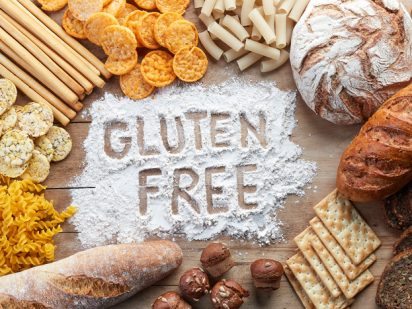By Kayla Cole, RDN, LRD
It’s been two-and-a-half years since I was diagnosed with celiac disease. Sometimes I feel like a pro and sometimes I still struggle. Anyone with a chronic disease can probably relate to that feeling.
May is Celiac Disease Awareness Month. I have written articles on celiac disease in the past and explained what the disease is and how it affects people, but for this article, I wanted to share some newer research and resources that might help people like me who sometimes still struggle.
Before I get into some research and resources, I feel as though I have a duty to try and clear up
some confusion that still exists about celiac disease. While some people with celiac disease live without any symptoms when gluten is ingested, many of us have symptoms that can last for weeks. This reaction can happen from the smallest contamination of gluten, such as putting a crouton on a salad and then removing it. Even if a person doesn’t have symptoms or they are mild, serious damage is still being done to your body.
People with celiac disease should not “cheat and just have a little every once in a while.” Not adhering to a gluten-free diet with celiac disease can lead to poor absorption of nutrients, anemia, infertility, and intestinal cancers, just to name a few. Even though many people try their best to adhere to a gluten free diet, sometimes symptoms still persist. For those with celiac disease, 30 percent still report symptoms while on a gluten free diet and miss an average of 23 school/work days annually due to celiac disease.
Some Good News
There is research happening on different drug therapies with the hope of reducing the burden of living with celiac disease and improving long-term health outcomes. (To see a complete list, visit:
https://celiac.org/about-celiac-disease/futuretherapies-for-celiacdisease/).
For example, one drug therapy in development is Nexvax2®. ImmusanT is a clinical development-stage biotechnology company working on Nexvax2®, the only disease-modifying treatment in clinical development today that has the potential to enable celiac disease patients to return to a normal diet. Booster shots of Nexvax2® would offer periodic reinforcements of the treatment to establish a prolonged tolerance to gluten. ImmusanT plans to release Nexvax2® first to protect patients from inadvertent gluten exposure (e.g., cross-contact with gluten when dining out), followed by a vaccine that would allow patients to resume a diet containing gluten. http://www.immusant.com/clinical-development/celiac-disease-programs.php
Some Bad News
Results from a new study suggest that cell immunity in the bowel is irreversibly altered by celiac disease. Dr. Bana Jabri, study author from the University of Chicago, explained: “Chronic inflammation caused by gluten causes an immunological scar that results in the loss of intestinal resident immune (gamma delta T cell) subset that has an important role in tumor surveillance and fighting against infection.”
This means that the damage caused by gluten results in the permanent loss of these beneficial immune cells in celiac patients. While a strict, gluten-free diet can alleviate many of the short-term symptoms of celiac disease, the diet alone is not enough to undo the permanent damage to the intestine.
Resources
Some people find apps like the Gluten Free Scanner very helpful to navigate shopping in the grocery store as label reading can be a daunting and confusing task.
Traveling and celiac disease don’t always mix well, so using the Find Me Gluten Free app can be very helpful to search – by city for example – to see where other people have eaten, how they would rate their experience, and if they got sick after eating there.
Nima is a portable gluten tester. Nima’s antibody-based chemistry was developed by MIT scientists to be faster, cheaper, and usable right at the dinner table. Nima is optimized to detect 20ppm of gluten which is the FDA standard for gluten free.
To learn more about celiac disease, visit the Celiac Disease Foundation website, www.celiac.org, or contact Kayla Cole, RDN, LRD, a clinical dietitian with Trinity Health at 701-857-5107 or [email protected].
Sources:
• www.celiac.org
• www.nimasensor.com
• www.immusant.com

